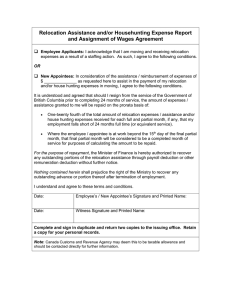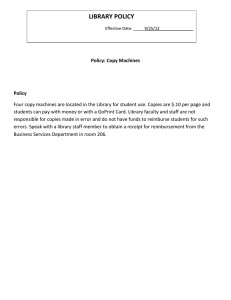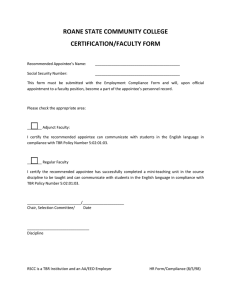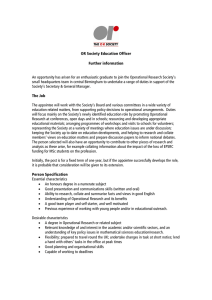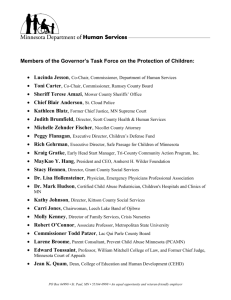Senior Management Group Moving Reimbursement
advertisement
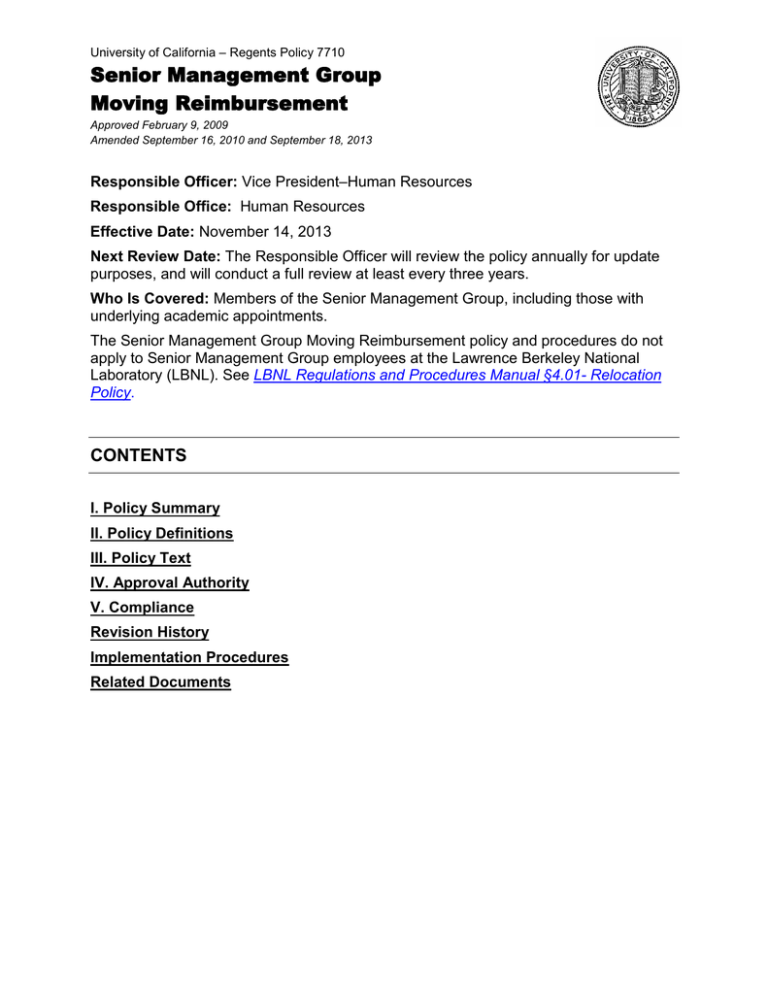
University of California – Regents Policy 7710 Senior Management Group Moving Reimbursement Approved February 9, 2009 Amended September 16, 2010 and September 18, 2013 Responsible Officer: Vice President–Human Resources Responsible Office: Human Resources Effective Date: November 14, 2013 Next Review Date: The Responsible Officer will review the policy annually for update purposes, and will conduct a full review at least every three years. Who Is Covered: Members of the Senior Management Group, including those with underlying academic appointments. The Senior Management Group Moving Reimbursement policy and procedures do not apply to Senior Management Group employees at the Lawrence Berkeley National Laboratory (LBNL). See LBNL Regulations and Procedures Manual §4.01- Relocation Policy. CONTENTS I. Policy Summary II. Policy Definitions III. Policy Text IV. Approval Authority V. Compliance Revision History Implementation Procedures Related Documents University of California – Regents Policy 7710 Senior Management Group Moving Reimbursement I. POLICY SUMMARY This policy describes requirements and process for the reimbursement of moving and relocation expenses for Senior Management Group members. It clarifies who is eligible to receive reimbursement of moving and relocation expenses, defines what types of expenses are reimbursable, and outlines the process for obtaining reimbursement. The policy supports the University’s objective to attract and retain talented individuals by offering competitive and fair benefits to help offset the costs associated with moving a Senior Management Group appointee to a new location. II. POLICY DEFINITIONS Common Carrier: A company that offers its services to the public to transport goods from one place to another. Domestic Partner: An individual designated as an employee’s domestic partner under one of the following methods: 1) Registration of the partnership with the State of California; 2) Establishment of a same-sex legal union, other than marriage, formed in another jurisdiction that is substantially equivalent to a State of California-registered domestic partnership; or 3) Filing of a Declaration of Domestic Partnership form with the University. If an individual has not been designated as an employee’s domestic partner by any of the foregoing methods, the following criteria are applicable in defining domestic partner: • each individual is the other’s sole domestic partner in a long-term, committed relationship with the intention to remain so indefinitely; • neither individual is legally married, a partner in another domestic partnership, or related by blood to a degree of closeness that would prohibit legal marriage in the State of California; • each individual is 18 years of age or older and capable of consenting to the relationship; • the individuals share a common residence; and • the individuals are financially interdependent. Exception to Policy: An action that exceeds what is allowable under current policy or that is not expressly provided for under policy. Any such action must be treated as an exception and must be reviewed and approved by the Regents. Executive Officer: The University President or the Chancellor. Members of the Household: The Internal Revenue Service (IRS) Regulations Section 1.217-2(b)(10) defines "members of the household" as other individuals who are members of the taxpayer's household, and who had the taxpayer's former residence and the taxpayer's new residence as their principal place of abode. A member of the 2 of 10 University of California – Regents Policy 7710 Senior Management Group Moving Reimbursement taxpayer's household includes any individual residing at the taxpayer's residence who is neither a tenant nor an employee of the taxpayer. Moving Expenses: Reasonable expenditures for transporting the appointee, members of his or her household, household goods and personal effects from his or her former primary residence to his or her new primary residence. Primary Residence: The dwelling where the employee actually lives and is considered as the legal residence for income tax purposes. Relocation: A change in the location of a current employee or new appointee’s primary residence due to a new appointment with the University. To be considered a qualified moving expense and not reportable as additional taxable income, the distance between an appointee’s new primary place of work and his or her former primary residence must be at least 50 miles or more than the distance between the appointee’s previous primary place of work and his or her former primary residence. Relocation Expenses: Reasonable expenditures other than moving expenses incurred in the process of relocating the appointee and members of his or her household to the location of the appointee’s new appointment (e.g. house hunting trips, return trips to the employee’s former residence, etc.). Top Business Officer: Executive Vice President–Business Operations for the Office of the President, Vice Chancellor for Administration, or the position responsible for the location’s financial reporting and payroll as designated by the Executive Officer. III. POLICY TEXT A. Eligibility for Reimbursement of Moving and Relocation Expenses Reimbursement of moving and/or relocation expenses is at the sole discretion of the University. Reimbursement of moving and/or relocation expenses should be offered when necessary to attract a potential appointee to the University or to encourage a current employee to accept an appointment at a new location. Before offering reimbursement of moving expenses, the employing department must confirm the availability of funds and the presence of the specific determinative criteria cited in this policy. The appropriate approval authority should be consulted before the hiring unit offers such benefits. Moving and relocation expenses that are not specifically addressed in this policy may be reimbursed or paid by the University only if approved by the Regents. To be eligible for reimbursement of moving and/or relocation expenses, an appointee must meet all of the following criteria: • The appointee must be a new hire or a current employee being assigned to a new location; • The appointee must be qualified for and have accepted and intend to fulfill his or her new appointment for at least one year from the date the appointment commences; 3 of 10 University of California – Regents Policy 7710 Senior Management Group Moving Reimbursement • The appointee must be in active status in the payroll system prior to reimbursement of moving or relocation expenses, unless the appointee has been approved for an advance to cover anticipated expenditures pursuant to Section III.G (Advances) of this policy; and • The appointee must be relocating his/her primary residence in order to accept the new appointment. B. Reimbursable Moving Expenses All or part of the following moving expenses may be reimbursed, subject to the required approvals and availability of funds: 1. Moving of Household Goods and Personal Effects Household goods and personal effects are limited to one household move per appointee. However, if the University appoints both an individual and his or her spouse or domestic partner, both appointees may be eligible for reimbursement of moving expenses from a former primary residence to the new primary residence. All moves of the employee and members of his or her household should be completed within one year of the date an appointee first reports to the new job, even if his or her appointment date was effective prior to the report date. The University will reimburse actual and reasonable expenses for common carrier transportation related to moving household goods and personal effects from the former primary residence to the new primary residence for the appointee and members of his or her household, including packing, crating, transporting, unpacking, and uncrating household goods and personal effects. The appointee must use a common carrier from the University’s preferred vendors list. Assembly and disassembly of unusual items such as swing sets, swimming pools, satellite dishes, etc. may also be reimbursed if authorized by the hiring authority. Expenses related to moving professional/scholarly books, records and equipment, including laboratory supplies, should be documented separately. Prior to incurring these expenses, the appointee should discuss with the appropriate hiring authority whether these expenses are reimbursable and what documentation is required for reimbursement. If the appointee elects to move household goods and personal effects on his or her own, costs of renting a moving van, truck, or trailer and moving equipment (e.g., hand truck) are reimbursable, as are moving supplies (e.g., packing materials and boxes). Costs associated with moving the following items are not reimbursable: • Animals (except for household pets consisting of domesticated animals normally and ordinarily kept or permitted in the appointee’s personal residence), • Plants, • Motorized recreational vehicles, including boats, kayaks, canoes, airplanes, camping vehicles, trailers, snow machines, jet skis, • Canned, frozen, and bulk foodstuffs, 4 of 10 University of California – Regents Policy 7710 Senior Management Group Moving Reimbursement • Building supplies, • Storage sheds, • Farm equipment, and • Firewood. 2. Transportation of Motor Vehicles The University will reimburse actual and reasonable expenses related to moving two personal motor vehicles per household (which may include motorcycles but excludes vehicles listed in the preceding section). The vehicles may be shipped or driven. If the vehicle is driven by the appointee or a member of the appointee’s household, the appointee will be reimbursed in accordance with Business and Finance Bulletin G-13, Policy and Regulations Governing Moving and Relocation. 3. Storage and Insurance The University will reimburse actual and reasonable expenses related to insurance for the household goods and personal effects while in transit, if incurred within any 30-day period after removal of the household goods and effects from the former primary residence. The University will also reimburse actual and reasonable storage costs for household goods and personal effects for up to 90 days immediately after their removal from the primary residence. 4. En Route Travel Expenses for the Appointee and Members of the Household The University will reimburse actual and reasonable expenses related to traveling to the new primary residence by the appointee and members of his or her household. Meals and lodging while en route to the new primary residence are reimbursable, including one day's lodging in the area of the former primary residence if the residence is not suitable for occupancy due to the move, and one day’s lodging on the date of arrival to the new primary residence. Reimbursement of these costs is made in accordance with Business and Finance Bulletin G-28, Policy and Regulations Governing Travel. 5. Household Pets The University will reimburse reasonable expenses related to transportation of household pets (consisting of domesticated animals normally and ordinarily kept or permitted in the appointee’s personal residence) but not those associated with kenneling such pets. 6. Utilities The University will reimburse expenses for connecting and disconnecting utilities but not for associated refundable deposits. 7. Appointee’s Passport Processing Expenses The University will reimburse the filing fee and cost of photos for a non-U.S. Citizen appointee when passport expenses are incurred in connection with the commencement of his or her work in the United States. 5 of 10 University of California – Regents Policy 7710 Senior Management Group Moving Reimbursement C. Reimbursable Relocation Expenses The University may reimburse limited relocation expenses actually and reasonably incurred by the appointee and his or her spouse or domestic partner. The following relocation expenses may be reimbursable: 1. House-Hunting Trips The University may reimburse actual and reasonable expenses associated with looking for new living accommodations for the appointee and his or her spouse or domestic partner for: • Cost of transportation (e.g., coach airfare, car rental, parking fees, tolls, gas), • Meals, and • Lodging. The appointee and his or her spouse or domestic partner are limited to two house hunting trips each. Travel must be in accordance with Business and Finance Bulletin G-28, Policy and Regulations Governing Travel. The maximum number of nights of reimbursable lodging is (10) ten. 2. Limited Housing-Related Expenses The University may reimburse the following limited housing-related expenses, if actually and reasonably incurred while the appointee and/or members of his or her household seek permanent housing: • Penalty paid to terminate the contract (e.g. lease or mortgage) on the appointee’s former primary residence if the termination was a result of relocation, • Cost of furnished temporary lodging (e.g., hotel, apartment, short-term rentals), up to 90 days, • Reasonable residential parking fees, up to 90 days, and • Meals for the first 30 days of residence in temporary quarters that do not have cooking facilities. Temporary lodging and meal expenses will be reimbursed in accordance with Business and Finance Bulletin G-28, Policy and Regulations Governing Travel. At the discretion of the University, the University may provide a temporary cash allowance to the relocating employee to offset limited housing-related expenses in lieu of reimbursement. This allowance would be paid through the University payroll system and would be subject to withholding for income and FICA taxes. 3. Return Trips to Former Residence The University may reimburse actual and reasonable costs of transportation if an appointee needs to return to his or her former primary residence to help with a move or because the appointee has been separated from household members for more than one month. The appointee is limited to two return trips. Reimbursable expenses related to transportation costs may include coach airfare or other actual costs of transportation (e.g. car rental, parking fees, tolls, gas). Return trips made in an appointee’s personal vehicle will be reimbursed in 6 of 10 University of California – Regents Policy 7710 Senior Management Group Moving Reimbursement accordance with Business and Finance Bulletin G-28, Policy and Regulations Governing Travel. 4. Professional Relocation Services The University may reimburse actual and reasonable expenses related to professional relocation services which may include providing local destination information, home sale assistance, home search at destination, and location of rental or temporary housing. D. Supporting Documentation In order to be eligible for reimbursement, all expenses must be supported by original receipts. E. Tax Treatment and Reporting of Moving and Relocation Expenses IRS rules determine whether payment of moving and relocation expenses by an employer is includable as taxable income that must be reported. Some reimbursements and advances of “qualified moving expenses” are not reportable as additional income. To be considered a qualified moving expense and not reportable as additional taxable income, an expense must meet the following criteria: • The move must be made in connection with the commencement of work at a new job location and the moving expenses must be incurred within one year from the time the appointee first reports to the new job, • During the 12-month period immediately following the move, the individual must be employed full time for at least 39 weeks, • The distance between an appointee’s new primary place of work and his or her former primary residence must be at least 50 miles or more than the distance between the appointee’s previous primary place of work and his or her former primary residence, • The expenses must be for transportation of household goods and personal effects, including packing, insurance and in-transit storage for periods of up to 30 days from the former primary residence to the new primary residence, and • The expenses must be for travel and lodging costs (but excluding meals) incurred in traveling from the former primary residence to the new primary residence. Detailed IRS rules determine whether the University must report certain expenses as taxable income. Taxable reimbursements made by the University are subject to withholding for payroll taxes, which will be deducted from the employee’s regular wages. For additional information regarding tax treatment and reporting requirements, please refer to the Business and Finance Bulletin G-13, Policy and Regulations Governing Moving and Relocation. Appointees should consult a personal tax advisor with questions about these requirements. Any payments to SMG members under this policy will be subject to reporting to the President and the Regents in the Annual Report on Executive Compensation. F. Repayment Provisions An appointee who voluntarily separates from the position prior to completing one year of service, or accepts an appointment at another University location within 12 7 of 10 University of California – Regents Policy 7710 Senior Management Group Moving Reimbursement months from his or her initial date of appointment, will be required to pay back 100 percent of the moving and relocation expenses. This provision will be included in the offer letter of the appointee. G. Advances The University, in its sole discretion, may elect to advance an amount to cover anticipated expenditures. Advances may only be used to cover reimbursable expenses and must be approved by the Executive Officer. An appointee receiving such an advance must sign an agreement for repayment as described in the Implementation Procedures for this policy. The hiring unit is responsible for ensuring that advances are accounted for within a reasonable period of time after the move is completed. See Business and Finance Bulletin G-28, Policy and Regulations Governing Travel for procedures applicable to recording uncleared advances. IV. APPROVAL AUTHORITY A. Implementation of the Policy The Vice President–Human Resources is the Responsible Officer for this policy and has the authority to implement the policy. The Responsible Officer may apply appropriate interpretations to clarify policy provided that the interpretations do not result in substantive changes to the underlying policy. The Office of the President Human Resources, will work with the Responsible Officer of each policy to implement each policy. B. Revisions to the Policy The Regents is the Policy Approver for this policy and has the authority to approve any policy revisions upon recommendation by the President. The Vice President–Human Resources has the authority to initiate revisions to the policy, consistent with approval authorities and applicable Bylaws and Standing Orders of the Regents. The Executive Vice President–Business Operations has the authority to ensure that policies are regularly reviewed and updated, and are consistent with the Principles for Review of Executive Compensation (Regents Policy 7201) and other governance policies. C. Approval of Actions All actions within this policy or that exceed this policy must be approved in accordance with Section IV.C. of the policy on SMG Appointment and Compensation (Regents Policy 7701). All actions that are applicable to members of the Senior Management Group or Officers of the University that are not expressly provided for under any policy must be approved by the Regents. 8 of 10 University of California – Regents Policy 7710 Senior Management Group Moving Reimbursement V. COMPLIANCE A. Compliance with the Policy The following roles are designated at each location to implement compliance monitoring responsibility for this policy: The Top Business Officer and/or the Executive Officer at each location will designate the local management office to be responsible for the ongoing reporting of policy compliance, including collecting all relevant compensation package activity, and creating specified regular compliance reports (such as a monthly compensation compliance report) for review by the location’s Top Business Officer. The Top Business Officer establishes procedures to collect and report information, reviews the specified regular compliance reports (such as a monthly compensation compliance report) for accuracy and completeness, reviews policy exceptions and/or anomalies to ensure appropriate approval has been obtained, and submits a copy of the compliance report to the Executive Officer for signature. The Executive Officer is accountable for monitoring and enforcing compliance mechanisms, ensuring monitoring procedures are in place, approving the specified regular compliance reports (such as a monthly compensation compliance report), and sending notice of final approval for the reports to the Senior Management Compensation Office, Top Business Officer, and Local Resources. The Vice President–Human Resources is accountable for reviewing the administration of this policy. The Senior Vice President–Chief Compliance and Audit Officer will periodically monitor compliance to these policies, and the process and results will be reported annually to senior management and the Regents through the Committee on Compensation. B. Noncompliance with the Policy Noncompliance with the policy is handled in accordance with The Regents’ Guidelines for Corrective Actions Related to Compensation Practices and Guidelines for Resolution of Compensation and Personnel Issues Resulting from the Findings of Audits and Management Reviews. Noncompliance is reported in the monthly compliance report from each location as approved by the Executive Officer and reviewed by the Senior Vice President–Chief Compliance and Audit Officer and the Regents at least three times per fiscal year. REVISION HISTORY As a result of the issuance of this policy, the following document is rescinded as of the effective date of this policy and is no longer applicable: • Senior Management Group Moving Reimbursement (Regents Policy 7710), dated August 1, 2009 9 of 10 University of California – Regents Policy 7710 Senior Management Group Moving Reimbursement Provisions of this policy pertaining to SMG members that appear in the following document shall be superseded by this policy, effective August 1, 2009: • UC Business and Finance Bulletin G-13, Policy and Regulations Governing Moving and Relocation IMPLEMENTATION PROCEDURES The Responsible Officer may develop procedures or other supplementary information to support the implementation of this policy. Such supporting documentation does not require approval by the Regents. RELATED DOCUMENTS • LBNL Regulations and Procedures Manual §4.01- Relocation Policy (referenced in the Who is Covered section of this policy) • Business and Finance Bulletin G-13, Policy and Regulations Governing Moving and Relocation (referenced in Sections III.B.2., E., and the Revision History section of this policy) • Business and Finance Bulletin G-28, Policy and Regulations Governing Travel (referenced in Section III.B.4.; Sections III.C.1., C.2. and C.3.; and Section III.G. of this policy) • Principles for Review of Executive Compensation (Regents Policy 7201) (referenced in Section IV.B. of this policy) • Senior Management Group Appointment and Compensation (Regents Policy 7701) (referenced in Section IV.C. of this policy) • Guidelines for Corrective Actions Related to Compensation Practices (referenced in Section V.B. of this policy) • Guidelines for Resolution of Compensation and Personnel Issues Resulting from the Findings of Audits and Management Reviews (referenced in Section V.B. of this policy) 10 of 10
